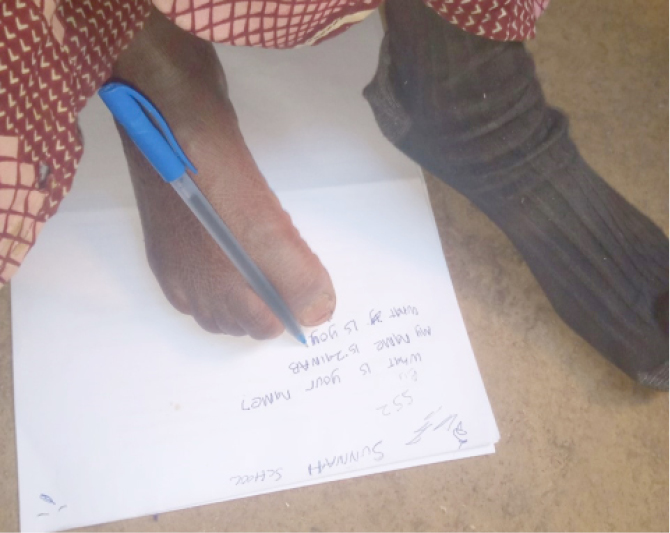An encounter with Zainab who writes with her toes
Twenty-nine-year-old Zainab Muktar, who lives in Jos, was born like any child, healthy and vibrant, but a sudden turn of event has left her unable to use her hands and moves with difficulty. Yunusa Ibrahim, Zainab’s elder brother, and teacher in her Sunnah School, said that Zainab was not born the way she is now. […]

… writing with her toes
Twenty-nine-year-old Zainab Muktar, who lives in Jos, was born like any child, healthy and vibrant, but a sudden turn of event has left her unable to use her hands and moves with difficulty.
Yunusa Ibrahim, Zainab’s elder brother, and teacher in her Sunnah School, said that Zainab was not born the way she is now.
- Target vulnerable poor with COVID-19 vaccine – FG urged
Bustle, hustle inside the famous Wukari Yam Market
“She developed the problem at her early age and her parents made several attempts in various hospitals to get her treated but could not succeed and later gave up because they were running out of cash.

Zainab, who is now an SS 2 student at Sunnah Academy, Jos, said she could not write fast but she was comfortable with the way she found herself.
She said she has been writing with her toes since when she entered primary school.
She said her teachers understood her situation and were patient with her, adding that she was normally given extra time during exams.
She explained that she had never experienced any stigma while in class with her mates, and that they played together and made fun during school hours.
“The problem started some 25-years back when her mother travelled with her and her younger sister, to Padera village in Bauchi State. Few days after arrival, both Zainab and her sister developed a strange sickness. They all returned to Jos and Zainab’s sister eventually died but she survived with cerebral palsy disease.
“Few years after she had developed that problem, the mother died. “
He said though her mouth and hands are twisted, she understands everything you tell her.
“She is often sent to buy things in shops and she knows what is right and wrong. She knows when to pray.”
Ibrahim said the family was forced to stop seeking medication for her because the father could not afford the cost.
In spite of her condition, Zainab still looked cheerful, when Benue/Plateau correspondent met her.
She said since she could not use her fingers to write, she had learnt how to use her toes to do that and carry out some chores.
According to her, she often puts a pen in between her toes to write and, usually, whenever she was asked a question either in writing or orally, she would respond either in writing or an action.

Zainab said she wanted to study Business Administration at Bayero University Kano (BUK) and engage in business after graduation.
She said she was not facing segregation or harassment from other students or teachers but her major challenge was how to raise school fees.
Dr. Nuhu Muhammed of the Medical Centre of Ahmadu Bello University, Zaria, told our correspondent that there are factors that usually contribute to such a disease.
He said, “The clinical presentation of Cerebral palsy may result from an underlying structural abnormality of the brain; early prenatal, perinatal or postnatal injury due to vascular insufficiency; toxins or infections or the pathophysiological risk of prematurity.
“Risk factors may include preterm birth, multiple gestation, grow restrictions abnormalities, among others. However, postnatal factors include infections, intracranial hemorrhage, periventricular leukomalacia, or hypoxia,” he added.
